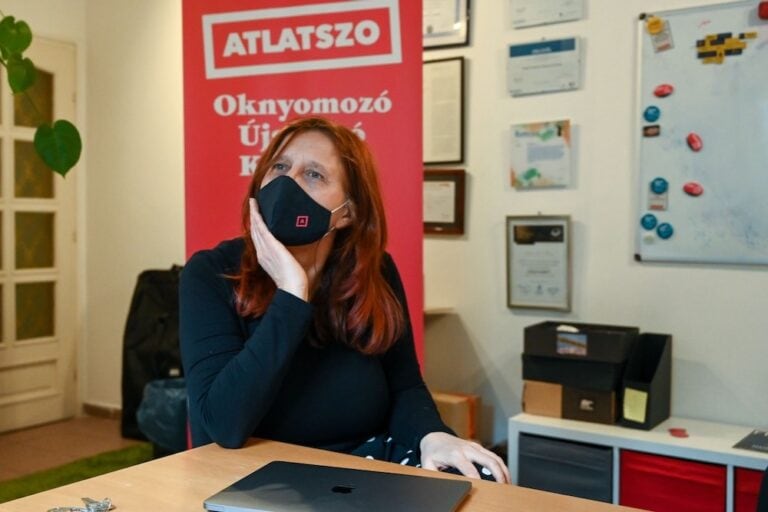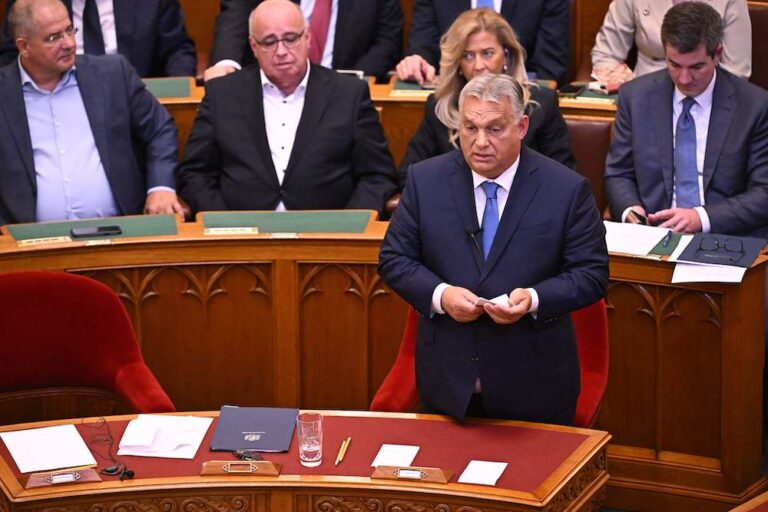(ARTICLE 19/IFEX) – The following is an Article 19 letter to Prime Minister Viktor Orbán: **Updates IFEX alert of 4 June 1999** Prime Minister Viktor Orbán Kossuth Lajos ter 1-3 1055 Budapest Budapest fovaros Republic of Hungary Fax: +36 1 268 30 50 Dear Prime Minister, ARTICLE 19, the International Centre Against Censorship, is greatly […]
(ARTICLE 19/IFEX) – The following is an Article 19 letter to Prime Minister
Viktor Orbán:
**Updates IFEX alert of 4 June 1999**
Prime Minister Viktor Orbán
Kossuth Lajos ter 1-3
1055 Budapest
Budapest fovaros
Republic of Hungary
Fax: +36 1 268 30 50
Dear Prime Minister,
ARTICLE 19, the International Centre Against Censorship, is greatly
concerned about the case of Laszlo Juszt, editor of “Kriminalis” magazine
and host of the television programme of the same name which is broadcast on
the state-funded MTV channel. We understand that he faces possible charges
of disclosing state secrets, in connection with documents published in
“Kriminalis” magazine, and that the magazine has been effectively closed
down for the present due to the authorities’ seizing certain equipment. We
are concerned too that Laszlo Juszt’s contract with MTV has been cancelled,
apparently due to the authorities’ action, although he has not been
convicted of an offence.
According to reports, on 3 June 1999 Laszlo Juszt published in “Kriminalis”
magazine certain documents which you had submitted to the Sub-Committee of
the National Security Office in support of allegations which you had made
some eight months previously accusing the former government of engaging in
illegal electronic surveillance of the Fidesz party. The documents, however,
apparently show that there was no evidence of such illegal surveillance
having been carried out.
Following publication of the documents in “Kriminalis”, the National
Security Office launched a criminal investigation against Laszlo Juszt on 8
June concerning a possible violation of national security. Warrants were
issued leading to a search of his apartment, the magazine’s premises, his
MTV office and his country house. The magazine’s computer equipment was
impounded for examination, effectively preventing further publication of the
magazine, and has yet to be returned to Laszlo Juszt. On the same day, his
contract was terminated by MTV on grounds that he was the subject of a
criminal investigation.
ARTICLE 19 is very concerned by the Hungarian authorities’ actions in this
case, which appear to be motivated by a determination to prevent or penalise
public disclosure of information likely to cause embarrassment to your
government rather than any genuine considerations of national security.
We understand that you presented the documents to the Sub-Committee at a
meeting which was on the public record and that only the documents were
given classified status. Other than one name, which was disguised in the
“Kriminalis” publication, the documents appear to contain no information
likely to endanger Hungary’s national security.
As you will be aware, international law permits freedom of expression to be
restricted on certain grounds, including the protection of national
security, but, equally, requires that, to be lawful and legitimate, any such
restriction must satisfy certain key criteria. These include, notably, that
the restriction is necessary to protect a legitimate national security
interest, such as to protect a country’s existence or its territorial
integrity against the use or threat of force, or for similarly weighty
reasons. A further criterion, which has been elaborated by the European
Court of Human Rights, among other authoritative bodies, is that any such
restriction, to be justifiable, must be such that it is “necessary in a
democratic society” – this means, in effect, that when restricting or
penalising expression on national security grounds a government must be able
to demonstrate not only that the expression poses a serious threat to a
legitimate national security interest, but also that the restriction imposed
is the least restrictive means possible of protecting the interest, and that
the restriction itself is compatible with democratic principles. It does not
appear that the Hungarian authorities are able to satisfy these criteria in
this case.
Further, if there is a clear public interest served by the publication of
particular information, including details about officials withholding
information relating to possible misconduct, then the disclosure of
classified information can readily be justified under international law. A
restriction which is justified on grounds of national security is not
legitimate or permissible when its primary purpose is to protect a
government from embarrassment or exposure of wrongdoing. The public has a
right to receive such information in order that it can hold the government –
its elected representative – accountable for its actions.
This case is particularly disturbing on its own account and because of the
example which the emergence of a fledgling free press in Hungary has set for
other countries in the region. If national security grounds are used in
Hungary to prevent the disclosure of information which should rightfully be
in the public domain, this will be a deeply retrograde step and influence
for trends elsewhere in the region. It will also put in question Hungary’s
planned membership of the European Union.
In light of these considerations, we urge you to ensure that any charges
against Laszlo Juszt arising from the “Kriminalis” article are dropped
immediately, that his office equipment is returned and the termination of
his MTV contract is revoked.
We await confirmation that your government will implement the above steps
Yours sincerely
Andrew Puddephatt
Executive Director
Recommended Action
Similar appeals can be sent to:
Appeals To
Prime Minister Viktor Orbán
Kossuth Lajos ter 1-3
1055 Budapest
Budapest fovaros
Republic of Hungary
Fax: +36 1 268 30 50
Please copy appeals to the source if possible.


